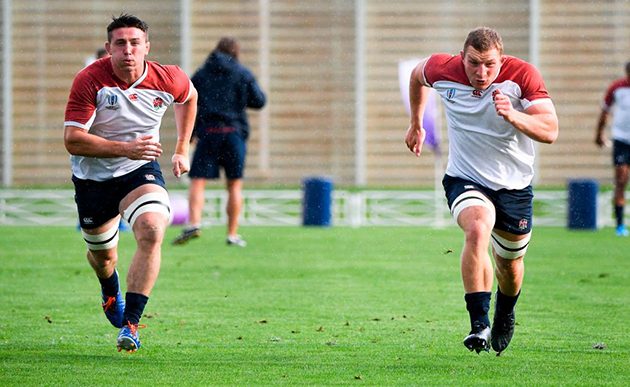It will be youth versus experience at the breakdown for the first World Cup quarter-final in Oita
England v Australia: Battle of the back rows
The term youth versus experience is often bandied around ahead of sporting encounters, but it is certainly true when you look at the two sets of flankers picked for the England v Australia World Cup quarter-final in Oita.
In the red-rose corner, there are young bucks Sam Underhill and Tom Curry – 44 years and 28 caps between them. In the Wallaby gold corner, there are a pair of wise men in Michael Hooper and David Pocock, with 58 years and 180 caps between them.
In terms of international rugby, the Aussies have six times more experience, not to mention the fact they’ve played in these big knockout matches before.
Related: England v Australia Preview
The breakdown has long played a decisive role in matches. Win that contest, deliver quick ball for your team and you have the perfect platform in attack. Compete hard for possession, slow the ball down and maybe win a turnover, and you not only disrupt the opposition but may earn a penalty for your team or secure ball to counter-attack with.

Grounded: Michael Hooper at the bottom of a ruck against Wales (Getty Images)
Wallaby scrum-half Will Genia is prepared for England trying to negate their attack at the breakdown this weekend, saying: “They have a forward pack that likes to be physical and obviously that works in and around the breakdown for them. If they can make that messy for us, it’ll probably disrupt our flow and disrupt our pace and the tempo we want to bring.
“So that’s an area as a team we have to make a focus on allowing us to play at tempo, so making sure we are clean at that breakdown and accurate.”
Then, of course, the referee’s interpretations come into play. It’s one of the areas where there can be a lack of consistency between officials. How far can you push the law? How strict will the referees be?
As Hooper says: “I’ve observed the ruck being refereed a multitude of ways, not one way in particular, so it’s quite tricky. The breakdown and turning ball over is a team effort, one to 23, and we have to adapt to what’s going on out there.”
That’s exactly where the experience of Hooper and Pocock comes into play. They will have seen referees officiate the breakdown myriad ways and should be able to change their tactics depending on Jerome Garces’s rulings in the quarter-final in Oita.

Two wise men: David Pocock warms up alongside Michael Hooper in Australia training (Getty Images)
Yet Underhill and Curry will not be cowed playing against two players they “aspired to be like” growing up. The word ‘brutal’ stood out in the quotes from Eddie Jones when he named his England team for this quarter-final and he will be expecting his flankers to challenge their older rivals.
“It’s going to be a great contest,” says Jones. “Pocock has probably, over the last ten years, been the foremost number seven in the world.
“Hooper is a massively important player for Australia. He’s a link player, takes the ball forward a lot once they get inside the opposition’s 22. He’s obviously a key leader for the team, but our two young boys are just getting better every game.
“Curry has improved his lineout jumping immensely over the last six or eight weeks. Underhill is probably the most combative seven I’ve seen for a long time.”

New skills: Tom Curry wins a lineout against the USA (Getty Images)
Underhill is certainly not intimidated by the calibre of opponent he will be facing in the quarter-final. “You always want to challenge yourself against the best in the world and it is fair to say they are two world-class opensides. I’m massively looking forward to it.
“Technically they are both very good over the ball. Pocock is probably the best in the world in terms of how strong he is, and his body position. On top of that they have good timing.
“In a way they are kind of a victim of their own success. You can see how much emphasis teams put on negating players who are good at the breakdown now, and how much of a team effort it is.
“You don’t want to give them space, the only space they can take is space that you give them. If you take that away you will have an easier contest, if you don’t you will have a more difficult contest. It relies on everyone, the ball-carrier, the support players, your position on the field, everything.”
Curry is relishing the physical contest too. “It’s why we like the game and it is probably hard to explain to your mum,” he jokes. “It is brilliant and you cannot get it any other walk of life. Part of the reason I love the game is the attrition.”
There will be plenty of subplots in this quarter-final but the one at the breakdown, that battle between youth and experience, will be fascinating to watch.
Keep track of events in Japan via our Rugby World Cup homepage.
Follow Rugby World magazine on Facebook, Instagram and Twitter.





